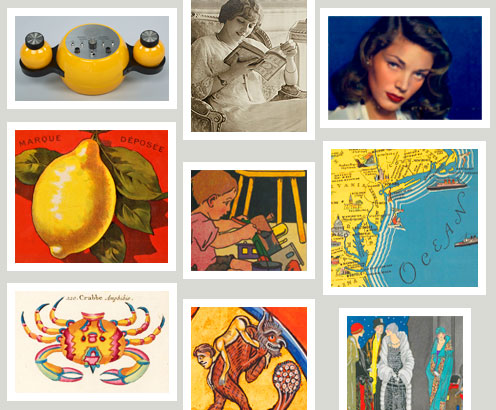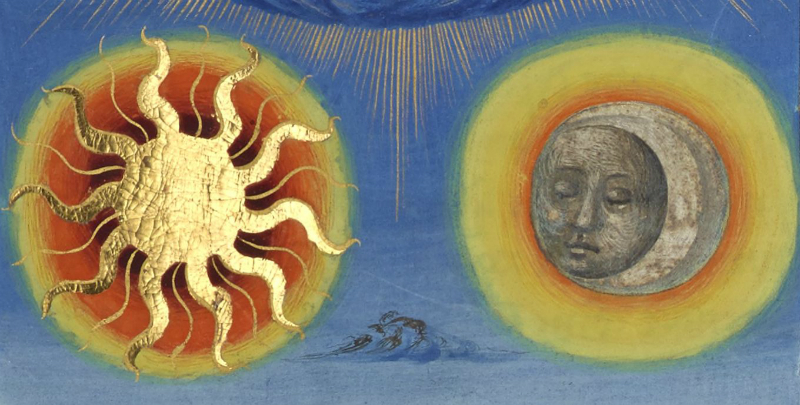Stephen Ellcock, the image hunter
Stephen Ellcock has made himself known with the fabulous iconography he is posting every day on Facebook and Instagram. This frequent visitor of Gallica talks about his research and his current projects.
Hello Stephen Ellcock, could you tell us a few things about yourself (professional activity, personal research activity)?
I am a London-based online collector of images, writer and researcher and former professional musician and bookseller (among other things). Nowadays I spend most of my time creating an ever - expanding, virtual museum on Facebook and Instagram, attracting some 280, 000 + followers and friends along the way.
How were created your social media accounts on Facebook and Instagram (context, editiorial line…)? Do you use them the same way?
My sister coerced and cajoled me into (very) reluctantly signing up to Facebook at a fairly low point in my life when I was recovering from a serious , debilitating illness. Initially, I found it insufferably mundane and tedious but gradually , as I connected with increasing numbers of interesting people , I was seduced and soon found myself spending a lot of time and money in internet cafes, as I didn’t actually own a PC , laptop or reliable, fully-functioning , internet-enabled mobile ‘phone at the time.After a year or so of maintaining a fairly low profile , I began to see the huge potential for exploiting Facebook as a unique powerful visual forum and very few people I encountered were using it in that way . Once I started posting images and realised that I could compile thematic albums containing an apparently infinite number of images, there was no stopping me and, encouraged by the response, it has snowballed from there until it has now well and truly hijacked my life.I resisted joining Instagram for many years but finally succumbed and opened an account about 18 months ago and I have subsequently become a compulsive user. Again, I was initially underwhelmed but now find the discipline imposed by Instagram’s inherent formal constraints to be both interesting and challenging.I regard posting on Instagram as an exercise in ‘pattern making’ whereas Facebook is an unwieldy, baggy, endlessly –unfolding shaggy dog narrative which seems in constant danger of collapsing into chaos, entropy or redundancy.
How did you discover Gallica?
Once I began posting regularly on Facebook, spending countless hours searching for material on Tumblr , Pinterest etc. and, more specifically, once I started compiling albums devoted to subjects such as cosmology; illuminated manuscripts; botanical and scientific illustration; religious iconography , eschatology and hagiography; alchemical , magical and occult texts and all things arcane, esoteric and visually startling, it soon become obvious that Gallica / BNF was an indispensable resource and mother lode for visual material. I now refer to Gallica more frequently than any other comparable online resource.
How do you use Gallica in the course of your personal research activity? In your private life or work?
I use Gallica constantly both for research purposes and for pure pleasure (often to the detriment and exclusion of my other supposed ‘leisure pursuits’ and ‘interests’).
How do you choose iconographic documents in Gallica? How and how much do you modify them before posting them?
Without wishing to lapse into mumbo-jumbo or obscurantism, I often think that images actually choose me rather than the other way round. Whilst I like to think that I am very rigorous and disciplined in my researches, I have lost count of the number of times I have stumbled upon the perfect image by accident, serendipity or whilst looking for something else entirely. If I weren’t such a natural sceptic, I might almost be tempted to suspect uncanny forces at work! I occasionally crop images for the purposes of Instagram in particular, but otherwise I almost never modify the images I post.
Do you have an anecdote about a document you discovered on Gallica?
When I posted an image of the Beast of the Apocalypse from Somme le Roi, Britanny ,1464. (BnF, Français 958, fol. 6v, one of my 9 selections) around the time of Donald Trump’s inauguration, it attracted considerable flak and abuse from aggrieved Trump supporters who assumed it was a deliberately insulting , satirical , ad hominem insult, which I think is rather revealing. The fact that the satirical intention on my part was deliberate is really neither here nor there.
Do you encounter specific difficulties during the course of your research work?
Many of the difficulties I encounter during the course of my researches can, I think , be attributed to gaps in my own knowledge, language skills etc.Finding images of the art of Africa , central and southern America , Oceania and central and south Asia , from sources other than the major European and American museums and institutions , still seems to be quite difficult , for the non-expert at least, but I may simply be looking in the wrong places.
Any exciting project for the future?
I am working on a book at the moment which , all being well, is scheduled for publication in September 2019.All being well, I will also be working on new projects with a couple of magazines and an extraordinary , very significant private collection of art and artefacts in the very near future. Announcements to follow presently.
Who is more likely to help you finding new sources?
I manage to find rich new resources almost every day, there really is far too much for one lifetime. I find it very difficult to resist the temptation to wander and explore , I undoubtedly have lost many , many months (probably even years) of my life this way.
A final word?
Two of the most important lessons I have learned from my researches into medieval literature, manuscripts and marginalia, are : 1. Cute cats have obviously always been irresistible to both high and low society, and 2. False Prophets and Beasts of the Apocalypse (many of them orange-coloured) have always been with us but none of them have triumphed …yet.
Follow Stephen Ellcock :






Commentaires
Félicitations
C’est fort interessant d’apprendre plus sur les méthodes et recherches de ce chasseur d’images extraordinaire. En particulier son côté fe flaneur instinctif. Merci Stephen
(It is v interesting to discover more on this extraordinary image hunter’s methods and research. I am intrigued by his instinctive flaneur qualities.)
Brilliant
Stephen, I adore your posts and compulsion to do so.
Stephen Ellcock on facebook.
Every morning when i log onto facebook I ask myself is "What will Stephen Ellcock post today?" .
Ajouter un commentaire